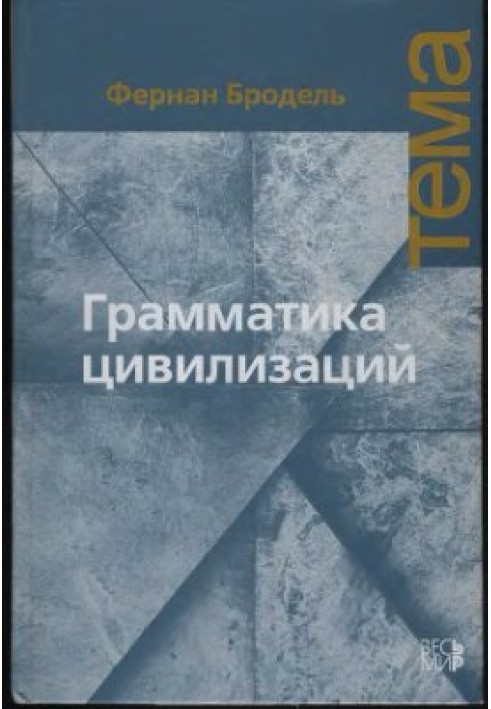Grammar of Civilizations
 Instant download
Instant download
after payment (24/7)
 Wide range of formats
Wide range of formats
(for all gadgets)
 Full book
Full book
(including for Apple and Android)
The work of the outstanding historian Fernand Braudel, the largest representative of the French historical school of the Annales, is devoted to the development of the civilizations of the West and the East. The book is published in Russian for the first time. “The Grammar of Civilizations” was written in 1963 and was intended by the author as a textbook for the secondary education system in France. However, it turned out to be too complex for a textbook, but it was received with great interest by the scientific community of the world, as evidenced by translations into many languages. Unlike other fundamental studies of the author, it is written in a much more accessible form, which facilitates the perception of Braudel’s concept not only by specialists, but also by a wide readership. Table of contents: From the publisher 10 Braudel teaches history. Maurice Aimard 11Instead of a preface 23Introduction. History and the present 28 SECTION I. GRAMMAR OF CIVILIZATIONS Chapter 1. Changes in terminology 33 Chapter 2. Civilization is defined in relation to other sciences about man 39 Civilizations as geographical and cultural spaces 39 Civilizations as social formations 45 Civilizations as economic structures 48 Civilizations as various collective thoughts 51 Chapter 3. Continuity of civilizations 54Look on civilizations from everyday life 54Civilizations and their structures 57History and civilizations 63SECTION II. CIVILIZATIONS BEYOND EUROPEAN PART ONE. ISLAM AND THE MUSLIM WORLDChapter 1. What history teaches 66Islam, a new form in the Middle East 66History of the Middle East 68Muhammad, the Koran, Islam 70Arabia: the problem of a barely urbanized culture 74Chapter 2. What does geography teach 68Lands and seas of Islam 79Intermediate continent or space-movement: cities 86Chapter 3. The greatness and decline of Islam (VIII-XVIII centuries) 79The absence of Muslim civilization until the VIII or IX centuries 92The Golden Age of Islam: VIII-XII centuries. 96Science and philosophy 103Stop or decline: XII-XVIII centuries. 107Chapter 4. Modern revival of Islam 113The end of colonialism and the youth of national identity 113Various Muslim states in the modern world 122Muslim civilization in the 20th century 130PART TWO. BLACK CONTINENTChapter 1. Past 138Geographical spaces 138Through the past of the Black Continent 146Chapter 2. Black Africa: today and tomorrow 156Awakening of Africa 156Economic and social problems 162Arts and literature 165PART THIRD. FAR EASTChapter 1. Introduction 170What does geography say 170Barbarism against civilization: evidence of history 178Ancient origins: reasons for cultural conservatism 182Chapter 2. Classical China 185Religious parameters 185Political parameters 197Economic and social parameters 203Chapter 3. China yesterday and today 210Times of unequal treaties: humiliated and suffering China ( 1839-1949) 210New China 215Chinese civilization in the modern world 222Chapter 4. India yesterday and today 227Classical India (before English colonization) 227English India (1757-1947): the old economic structure that came into conflict with the modern West 244Will India build an economy through the Chinese revolution like? 252Chapter 5. Primorsky Far East: Indochina, Indonesia, Philippines, Korea 262Indochina 263Indonesia 267Philippines 274Korea 275Chapter 6. Japan 281Primitive Japan before the beginning of Chinese civilization 281The impact of Chinese civilization on Japan 285Modern Japan 293SECTION III. EUROPEAN CIVILIZATIONS PART ONE. EUROPEChapter 1. Space and freedoms 305European space is defined: V-XIII centuries. 305Freedom or, more precisely, freedom: XI-XVIII centuries. 312Chapter 2. Christianity, humanism, scientific thought 328Christianity 328Humanism and humanists 333Scientific thought until the 19th century 355Chapter 3. Industrialization of Europe 362At the origins of the first industrial revolution 362The spread of industrialization in Europe (and outside Europe) 371Socialism and industrial society 376Chapter 4. Components of Europe 386Brilliant Ingredients: Art and Reason 386Solid Ingredients: Economics 393Aleatory (Problematic) Ingredients: Politics 400Europe in 1981 Notes by Paula Braudel 409PART TWO. AMERICAChapter 1. Another New World: Latin America 411Space, Nature and Society: Literary Evidence 411Facing the Racial Problem: Almost Brotherhood 418Civilizations Tested by Economics 424Chapter 2. America Par excellence: the United States 440The Vital Past: The Sum of Opportunities Given 442Colonization and Independence 442The Conquest of the Far of the West 450Industrialization and Urbanization 454Chapter 3. Ghosts and Difficulties: Yesterday and Today 462The Old Nightmare: the Race Question or a Population That Cannot Be Rid of 462Capitalism: From Trusts to state intervention and oligopolies 466The United States and the rest of the world 476Chapter 4. About the English world order 485In Canada: France and England 485South Africa: the Dutch, the English and black Africans 489Australia and New Zealand or England, finally left alone 494PART THREE. OTHER EUROPEAnother Europe: Muscovy, Russia, USSR 500Chapter 1. From the origins to the revolution of 1917 501Kievan Rus 501Orthodox religion 505Russian Empire 508Chapter 2. USSR from 1917 to the present day 518From Karl Marx to Lenin 518Marxism and Soviet civilization today 526October Congress of the CPSU (1961 ) 537
Data sheet
- Name of the Author
- Фернан Бродель
- Language
- Russian
- Translator
- Б. А. Ситников

















